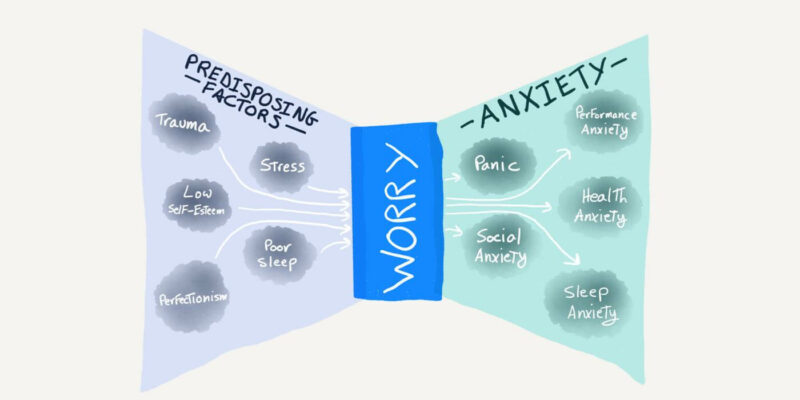A lot of people are understandably feeling pretty anxious about what’s going on with the coronavirus.
There’s a lot of fear about getting sick or what might happen if the virus becomes so widespread that our infrastructures can’t handle it. There’s panic about having enough food and supplies in case things get really bad. There’s a loss of trust in many of our governmental institutions. And there’s just a lot of uncertainty about how it’s all going to play out in the coming weeks and months.
As a psychologist, I’ve gotten dozens of questions and requests in the last few days from people about how to manage their anxiety and worries around the coronavirus. And while I’m not in any way an expert in public health, medicine, or epidemiology, I am an expert in anxiety. What follows are 10 pieces of advice for managing your anxiety during the coronavirus outbreak.
Things are scary and serious, no doubt about it. But if we’re going to get through this well, we need to keep our heads. And that means not adding any unnecessary or unhelpful anxiety on top of an already scary and stressful situation.
1. Validate your fears and worries first.
This is a scary time, full stop. Feeling afraid and worrying about the coronavirus is completely natural and even healthy to some extent given the circumstances. Our brains evolved a threat-detection system for a reason. In the long run, it won’t do you any good to try and deny this. What’s more, beating yourself up and getting judgmental with yourself for feeling afraid is a losing proposition.
When we engage in lots of negative self-talk about our anxiety and worries, it trains our minds to be afraid of anxiety itself. Telling yourself that you’re an idiot or weak because you find yourself worrying is a great way to end up worrying more and feeling even worse.
Instead, practice a little self-compassion by validating your fears and worries. All this means is, take a moment anytime you’re feeling anxious to literally remind yourself that it’s understandable and completely valid that you feel afraid. Whether or not your fears are completely rational or justified, in times like these it’s not surprising that your mind—whose most important job, remember, is to keep you alive—is sounding the alarm.
You don’t need to wallow in your anxieties or obsess over them. Simply take a minute to remind yourself that it’s okay to feel however you feel. This will set you up better than anything else to have lower anxiety overall and be able to take productive action when you need to.
2. Distinguish worry from problem-solving.
Worry is the mental act of trying to problem solve something that isn’t really a problem or a problem that can’t be solved at the time. It’s inherently unproductive and generates more and more anxiety.
For example, you can’t control or do anything about whether the president does or does not have coronavirus. So, is it helpful for you to spend your time and energy worrying about it?
The trouble is, worry looks and feels a lot like true problem-solving, which is productive thought about a problem that can potentially be solved.
In addition to all the stress and anxiety it generates, worry has another hidden cost—all the energy we pour into our worries is energy we can’t invest in genuinely helpful or productive thinking. This is the opportunity cost of worry.
I think we all know that feeling of being paralyzed by worry—sitting around, anxiously spinning our wheels, only to feel worse and worse.
So, if you find yourself increasingly anxious, stop and consider your current thinking patterns. Ask yourself: Is the way I’m thinking now actually helpful?
3. Scheduled time to worry on purpose.
This one’s counterintuitive but it’s actually an incredibly powerful way to tamp down high levels of worry and anxiety.
One of the problems with worry is that it feels so automatic and outside of our control—as if our brain is sabotaging us with it. Well, this is partly true.
Your brain throws worries at you because it thinks you’re in danger. The trouble is, if you respond to those worries with more attention and elaboration, you’re encouraging your brain to do more of it. In other words, the more attention you give your worry, the more you reinforce it in the future.
While it’s best to briefly validate then ignore your unhelpful worries, this can be hard—especially when the worry is big and about something really scary (like, say, a pandemic).
So, one of the ways you can train your brain to not bombard you with countless worries throughout the day is to teach it that there’s a specific time and place where it’s allowed to worry.
Like training your dog to poop in the right part of the yard, you can train your brain to worry at certain times (and not in others) with some good old-fashioned positive reinforcement.
Here’s what scheduling time to worry on purpose looks like:
- Pick a time each day when you can sit down with a pen and paper for 5 to 10 minutes.
- During that time, try your hardest to write down every worry you can think of no matter how big or small. Importantly, you’re just listing your worries, not trying to solve them. Think of it like a brainstorming session. The idea is simply to get them out onto paper.
- Once your 5 or 10 minutes is up, put the paper away until the following day.
- Repeat daily. This won’t work right away, but after several days, your mind will start to learn that it has its own special time to worry, which means it will be less likely to throw worries at you all throughout the day.
- If you find yourself worrying during the day, briefly validate the worry, then remind yourself that you’ll get to it during your scheduled worry time. Then, redirect your attention back to what you want or need to be doing.
4. If you’re feeling helpless, be helpful.
Of course, many of us are feeling helpless right now. We’re at war with a microscopic virus we can’t see, touch, taste, feel or otherwise detect until we’re already at its mercy. And what’s more, we have very few weapons with which to fight back right now. Why wouldn’t we be feeling helpless?!
But just because you feel helpless doesn’t mean you need to sink into despair, apathy, or paralyzing levels of anxiety and panic.
One of the best ways to counteract the feeling of helplessness is to be helpful to other people.
If you’re sitting at home on the couch watching your third hour of coronavirus coverage, try shutting off the tube for a bit and brainstorming some ideas for how you might help people who are worse of than yourself:
- If you have a kid, try having a serious but developmentally appropriate conversation about what’s really going on. Kids are smarter than we often give them credit for. Which means they probably know more and are worrying more than we think. Instead of assuming the less they know the better, consider giving them some information and modeling how to handle fear in a healthy, mature way.
- A lot of small businesses (and the families who own them) are going through some really hard times right now as people stop spending money on typical activities. Consider buying some gift cards, for example, from your favorite local restaurants to help them out with cash flow during a really hard time. Then, when things get better, you can either go out or give the cards to someone else.
- Some of the people getting hit hardest by the virus seem to be elderly people. If you have elderly neighbors, friends, or family, consider how you might be useful or helpful to them. Even a simple phone call could go a long way for an older person who’s maybe feeling especially scared or lonely right now.
- Of course, our health care professionals are really taking a hit right now. Besides putting their own lives and health at risk by just doing their job, they’re also often working extremely long hours in very demanding circumstances. If you know someone who’s in healthcare, consider offering to help them out with groceries, watching their children, or just reaching out to ask if you can help somehow.
There are countless examples of how you might be helpful to others during a difficult time like this. Aside from helping to alleviate your own feelings of helplessness and anxiety, you’ll also be doing your part to help the bigger problem indirectly (something no amount of worrying or hand-wringing will accomplish).
5. Move, move, move.
We’ve known for decades that one of the best ways to alleviate and prevent anxiety is exercise. In fact, almost any kind of moderate level of exercise for 10 or 20 minutes seems to be helpful for anxiety.
If you can, consider trying to make the extra effort to get some more exercise and movement into your life. Of course, social distancing and, for some quarantines, make traditional exercise difficult. But even if you can’t leave your house, you can start doing pushup, lunges, yoga, or something similar. Heck, you could even put on some tunes and have a little dance party!
Sometimes the simplest solutions are the most powerful. Unfortunately, because they’re so simple, we tend to overlook them. Physical movement and exercise is one of the most powerful anti-anxiety techniques we have. Use it in whatever way you can.
6. Be intentional about your media consumption.
During difficult times and crises, we all need to stay informed. This often means keeping up-to-date on the news in whatever medium you get it—newspaper, cable news, social media, etc.
But, it’s all too easy to slip from helpful information consumption to unhelpful information consumption. I mean, how many times have we told ourselves we were just going to turn on the news for a few minutes to hear the latest updates, only to find ourselves still on the couch an hour and a half later—not any more informed than we were 90 minutes ago but racked with anxiety and worry.
During times of stress, it’s natural to fall back on our default habits and behaviors. But it’s during times of serious stress when we actually need to be less automatic and more deliberate than ever. So, of course, we all need to stay informed, but it’s important to ask yourself how much is enough and how much is too much?
Do you really need to be watching 4 hours of news each day and reading the New York Times cover to cover?
Maybe an hour of news per day is sufficient to keep you informed without adding loads of unnecessary stress and anxiety on top of it?
7. Call up good friends.
Even 15 minutes of good conversation with someone you really love and enjoy can do wonders for your anxiety.
Unfortunately, during times of stress, we tend to isolate or spend even more time with people we don’t especially like (talking heads on the news, influencers on Instagram, etc.).
Even though we may need to physically isolate ourselves, there’s no reason we need to socially isolate ourselves. Why not call a friend? Sure, it’s old tech, but the humble phone call can be a remarkable tool for managing anxiety.
The next time you’re feeling anxious, try picking up the phone and chatting with a friend. It doesn’t have to be about the virus and everything that’s going on right now either. Just connect and your anxiety will improve.
8. Tighten up your sleep routines.
I’m hearing from a lot of people lately about difficulty sleeping. They find that they can’t shut their minds off when they get into bed and end up laying there worrying for hours unable to sleep.
Unfortunately, everything is harder when we’re not sleeping well. From physical energy to emotion regulation, it’s hard to be on our A-game when we’re not sleeping very well.
But the key to keeping your sleep good during anxious and uncertain times is to tighten up your habits and routines around sleep to ensure consistent, quality sleep each night.
Here’s how to tighten up your sleep during times of stress:
- Don’t get into bed until you’re actually sleepy. Let your body, not the clock, dictate when you get in bed. If you get into bed when your body’s not actually ready for sleep, you’re likely to end up worrying and anxious, which makes it even harder to sleep.
- If you can’t sleep, get out of bed until you’re sleepy. If you wake up in the middle of the night and find it hard to fall back asleep, simply get out of bed and read or watch old sitcom re-runs until you’re sleepy again. Then get back into bed. The worst thing you can do is stay in bed worrying about not sleeping, because this trains your mind to associate fear and worry with your bed. Not good.
- Pick a consistent wake-up time and stick to it every day. When we continually flip-flop our wake up time, we contribute to what’s called social jet lag, which leads to the same symptoms as real jet lag but without the jets. The reason is, your body’s main signal for when it gets sleepy at night is simply how long you’ve been awake. If you’re waking up at different times throughout the week, your body is never going to develop a consistent pattern of sleep and wake.
- Set an alarm and stick to it (No sleeping in!). When you first wake up in the morning, your brain is still “coming online,” which means it’s harder to think logically and rationally. As a result, when you lay in bed, snoozing after your alarm, your chances of getting caught up in worry and anxiety go way up. By far the best way to avoid the common early morning anxiety many people experience is to simply get right out of bed and get going first thing in the morning.
- Exercise more. Physical activity, and especially exercise, improves our sleep drive through the day. This means that we’re both sleepier in the evenings and more likely to fall asleep quickly, but also that we’re more likely to sleep through the night. If you want to get better sleep, try your best to be more active.
9. Pick up that old hobby.
Apparently Shakespeare wrote King Lear while in quarantine for the Bubonic plague. I’ve also heard Issac Newton got the ball rolling on the whole calculus thing during his own quarantine. Honestly, I haven’t fact-checked these but it makes sense. And maybe there’s a bit of wisdom in there for all of us…
When things are stressful and scary, it’s easy to get paralyzed by fear and anxiety. And doing things to not feel anxious will only take you so far. On the other hand, if we can fill our lives and attention with positive, constructive tasks and activities, the anxiety will have less room to grow and fester.
So why not dig out your guitar from the closet and watch some tutorials on YouTube? Or get out that old watercolor set and start painting again? Been wanting to start a podcast for a while but never found the time? Why not now?
My point is, reducing anxiety isn’t just a subtraction problem—what can I do to eliminate this anxiety? It’s mostly an addition problem—what can I fill my life with such that anxiety has less of a hold on me?
It’s going to be hard to consistently keep your mind off your worries and fears if you don’t have a positive, appealing alternative to rest it on. Why not pick up an old hobby?
10. See a professional.
If your anxiety is starting to significantly impair your life, you should consider talking to a professional. Even though physically meeting with a therapist, counselor, or other mental health professionals may be off the table for now, it’s very much possible to do so remotely with tools like Skype, Zoom, and others.
If you’ve seen a therapist in the past, consider calling them up and seeing if you can at least schedule a session or two with them.
The following databases are also a good place to begin looking for a local therapist:
- The American Board of Professional Psychology, Behavioral and Cognitive Psychology Division
- The Association for Behavioral and Cognitive Therapy
- The Academy of Cognitive Therapy
- The Anxiety and Depression Association of America
Keep in mind, it’s not just adults who are struggling… Children can experience a lot of stress and anxiety, but because they can’t articulate it as well, it may be difficult to notice. In fact, some fascinating data from Mightier has shown that children’s heart rates have risen over the course of the pandemic and are still elevated.
If you feel totally overwhelmed by the idea of searching for and finding a mental health professional, I wrote a book on the process and how to do it step-by-step. You can buy the physical copy or Kindle copy on Amazon here. But I’m also happy to just send you a PDF for free. Just email me (hello@nickwignall.com).
Finally, you could try a virtual counseling service like Talkspace as well.





20 Comments
Add Yoursjust a quick blip I posted I believe on Facebook from my late Mom(so smart and spiritual who lived to be 93, cancer in 1958(when everyone died), was a worrier but never showed it(prayer)..always said to me, even growing up…”95% OF THE THINGS YOU ARE WORRYING ABOUT WILL NEVER HAPPEN AND THE 5% THAT DO, YOU AREN’T GOING TO STOP THEM BY WORRYING ABOUT THEM!”- I am a lot older now and I wish I could say I followed that advice, but it was hard! Have a great day and thank you!
Thanks, Joseph!
So helpful, Nick! I am doubling down on my current routine, which includes your steps. I’ll be sure to share this post with others.
Thanks Caitlin! Yeah, all this stuff is hard enough, but it’s especially hard, I think, for folks suffering from anxiety already! Thanks for sharing 🙂
Thank you. I needed this today.
You’re very welcome, Anna. Glad it was helpful.
Yeah, I’m one who has already been struggling with anxiety too and the big fear is “can I not get better now until external things get better?” Thank you for all your clear and informed posts.
You’re welcome, Andrew!
Hi Nick.
I live in Sudan where quarantine has not been enforced yet. But I’m on leave from my job, so a lot of free time – and news consumption.
So, thanks for these useful pieces of advice.
You bet, Maria! Stay safe.
Thanks for this post, Nick! Most helpful when most needed.
You’re welcome, Alicia. I’m glad it was helpful. —Nick
Nick- A great edition this week, as always. I am including a link to this in our weekly newsletter at SHMS.
Thanks Ted. Hopefully, it helps a little!
Thank you so much for all your wonderful articles. I think your descriptions and suggestions regarding anxiety (and many other topics) have been some of the most helpful that I have read. I am a Family Physician and find myself forwarding your information to my patients quite frequently. Keep it coming! I appreciate it!
Thanks for the kind words, Mindy! Glad the articles have been helpful. And thanks for all you do too!
Hello Nick!
This article is just what I
desperately needed today, with so many helpful suggestions and
brilliant ideas, AS USUAL NICK!
I have a big challenge to take the positive actions after your ‘mega-inspirational pep talk for my soul’!!!
Honestly Nick, I have trouble following through despite very intense inspiration throughout decades???????????? But, I will keep you posted, as I immerse myself in back issues of your NEWSLETTER, NEVER WANTING TO BE REMOVED FROM LIST, THANKS A MILLION NICK!!!!!
Thank you for this article.
I have been experiencing a lot of anxiety from pandemic.
This piece is a great first step to reacting differently and feeling some relief.
Number 3- Scheduled time to worry is proving invaluable!
walking my dogs, limiting the news I consume and the social media and….knitting. Knitting is oddly calming and meditative even when I have to rip everything out and start all over
I was so glad to have read these tips about conquering anxiety specially this time of pandemic for more than a year already. It is really fearful because as I observed the situation now, covid variant is more pronounced compared to last year. But when I am contemplating with your discussion on how to avoid disturbing one’s self, I felt am at eased. Thank you very much because I can also share this to others who are feeling depressed in our community.